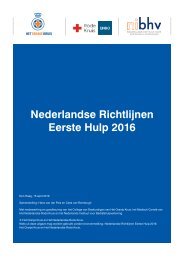Thesis-Anne-Vos-Masters-SBR-and-EU-Law-3
Thesis-Anne-Vos-Masters-SBR-and-EU-Law-3
Thesis-Anne-Vos-Masters-SBR-and-EU-Law-3
Create successful ePaper yourself
Turn your PDF publications into a flip-book with our unique Google optimized e-Paper software.
also why the government has excluded water extraction <strong>and</strong> groundwater protection areas from the<br />
scope of the plan area of the Draft MSL (for the plan-EIA), although the deeper soil is not excluded<br />
hereof. 185 Also, it should be mentioned that bore free zones are not excluded a priori.<br />
4.6.3 Soil<br />
The Wet bodembescherming (Soil Protection Act), also called Wbb, regulates the protection of the<br />
soil. This includes the arrangement of the sanitation of polluted soil <strong>and</strong> groundwater. The Wbb<br />
lays down a duty of care on anyone that operates in or on the soil who could have reasonably<br />
known that due to those operations the soil could be polluted or harmed. That person is obliged to<br />
take all measures needed that could be reasonably expected from him to prevent the pollution or<br />
harm. If the pollution or harm has already occurred, that person should limit the pollution or harm<br />
<strong>and</strong> the direct consequences thereof. This duty of care applies to the operations as referred to in<br />
the Articles 6 to 11 Wbb. This includes inter alia operations where substances that can<br />
contaminate or impair the soil are placed in the soil (so as to leave it there), operations where<br />
substances which may pollute the soil are added to the soil in order to affect the structure or quality<br />
of the soil, where operations are performed or materials are used which can contaminate or affect<br />
the soil, etc. However, it only applies to cases of contamination before 1987. 186 The duty of care<br />
does not only apply to the direct causer of the contamination, but also to those who are competent<br />
<strong>and</strong> actually capable of preventing or limiting the offender of the duty of care. The competent<br />
authority for the application of the duty of care is the Provincial Executive (Art. 88 Wbb).<br />
Supervision <strong>and</strong> enforcement of the duty of care is done by B&W, the Provincial Executive <strong>and</strong> the<br />
Minister of I <strong>and</strong> M (Art. 95 Wbb). One who performs operations as referred to in Articles 6 to 11<br />
Wbb <strong>and</strong> notices a contamination or degradation of the soil thereby, makes a notification to the<br />
Provincial Executive (Art. 27 Wbb). If one wants to start to sanitation of the polluted soil, he must<br />
make a notification of that intention (Art. 28 Wbb).<br />
In July 2009, the 'Convenant bodemontwikkelingsbeleid en aanpak spoedlocaties' ('Covenant soil<br />
development <strong>and</strong> tackling urgent sites') was adopted. Here, it is (inter alia) decided that the policy<br />
on soil sanitation must be integrated into a regional approach. This policy decision was<br />
implemented in the Wbb on 1 July 2012. 187 The Covenant also states that there should be a basic<br />
registration system for soil (BRO). This register will be applicable from 1 January 2015. The<br />
Convenant also mentions that the obligations from the Water Directives (European Framework<br />
Directive Water <strong>and</strong> the Groundwater Directive) should be the pre-conditions when developing new<br />
policy.<br />
4.6.4 Storage of waste<br />
The deposit <strong>and</strong> storage of waste is regulated in Chapter 10 of the Wet milieubeheer. The national<br />
policy on the h<strong>and</strong>ling of waste is set out in the L<strong>and</strong>elijk afvalbeheerplan 2009-2021 (National<br />
waste management plan 2009-2021). Here it is explicated that the storage of waste in the soil<br />
includes the storage of waste by recovery, deposition or injection. For the deposition of waste<br />
applies currently a 'moratorium'. After all, the deposition of waste goes against the intended<br />
purpose of the soil.<br />
What could be important for shale gas activities is the injection of waste in the soil. There is only<br />
permission granted for this to mine establishment for the production of oil, gas <strong>and</strong> salt if it<br />
concerns the recycling of waste streams that arise during the production process. 188<br />
185<br />
Draft MSL (2014), p. 16 <strong>and</strong> p. 18.<br />
186<br />
http://www.infomil.nl/onderwerpen/klimaat-lucht/h<strong>and</strong>boek-water/wetgeving/wet-bodembescherming-0/zorgplicht/<br />
187<br />
H.E. Woldendorp (2012), part 2, pp. 4-8.<br />
188<br />
H.E. Woldendorp (2012), part 1, p. 11.<br />
45



